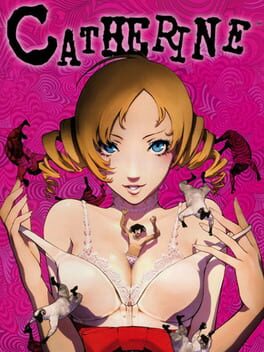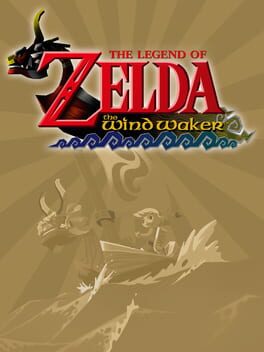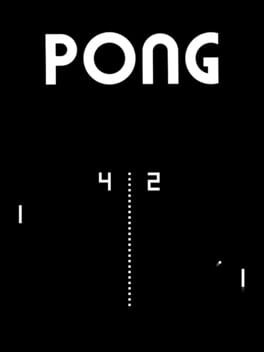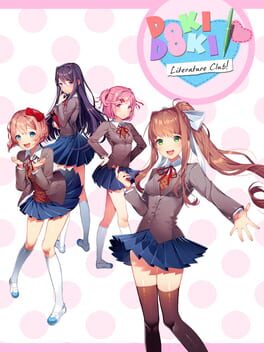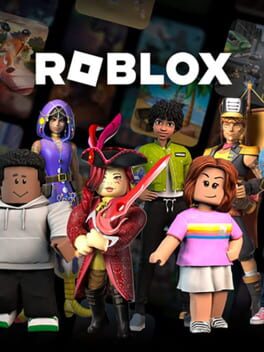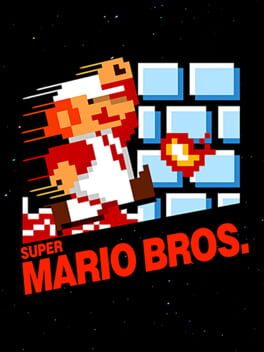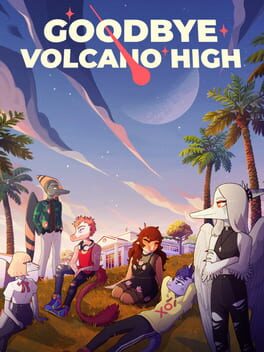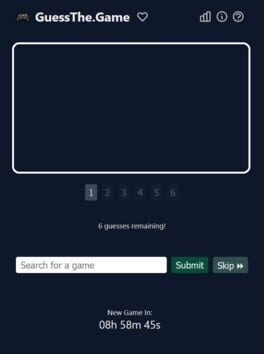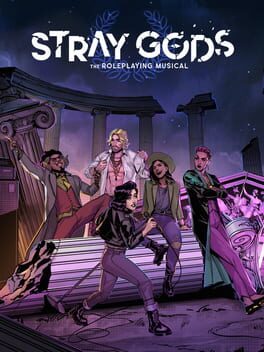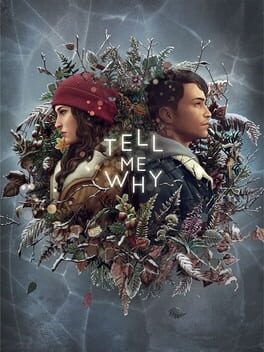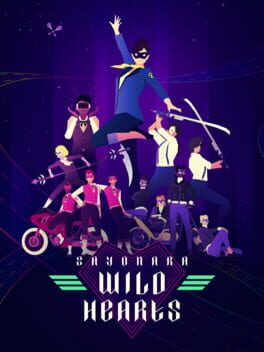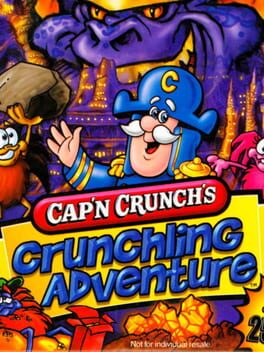Hot_Anarcocoa
BACKER
2011
This review contains spoilers
"False dichotomy the video game" is how I always refer to this game. The premise of the game's plot is that you play as Vincent, a sheepish coward of a man who is engaged to a woman named Katherine-with-a-K. One night while at the bar you frequent nightly with your friends, you meet a girl named Catherine-with-a-C, and end up cheating on your fiancé with her. This becomes a regular thing, and the central conflict of the game is making binary choices that decide who you'll end up with. The whole game is broken into two distinct sections. While you're awake you are at a bar with your friends, and this is where all of the story bits happen, talking with everyone there. While you're asleep you are trapped in a nightmare realm in which some monster representing Vincent's relationship fear of the night is tormenting him, and he must do a block moving puzzle game to escape death. The two stars I am giving this game are because the puzzle sections are genuinely good, and if that was all this game was I would love it.
Unfortunately, this game has Things It Wants To Say™ and those things are pretty horrible. At the end of each puzzle section you are put into a confession booth and given a series of false dichotomy questions to answer. The one that always stuck out to me was "Does life begin or end after marriage?" To answer this question honestly in either direction is equally cynical, marriage can be a part of life, but it is neither the beginning nor the end of it. During one of the the bar segments I also remember a patron asking a similarly asinine false dichotomy question, "Who do you hate more, men or women?" These are the two examples that stick out most in my memory, but every question the game throws at you is like this.
The reason every choice in the game is framed this way is because the game has an extremely sexist assumption at its core. I suppose if I were to apply a more feminist framework to my dubbing of the game as "false dichotomy the game" I could instead give it the moniker of "virgin-whore dichotomy the game." You see, each of the two options of every question you've been answering falls into one of two categories, "freedom" or "order", and each of these ideas are represented by Catherine and Katherine respectively. There is zero room for grey here, if your answers were too close to a 50/50 split throughout the game, Vincent ends up alone as he can't decide what he wants. If you choose "Order" you end up with Katherine, who the game frames as mature, dull, and controlling, but stable. And if you choose "Freedom" you end up with Catherine, who the game frames as infantile, sexy, and exciting, yet erratic. You cannot be free with Katherine, and you cannot have order with Catherine, according to the game you must choose, virgin or whore. If you think I'm being too harsh, here is the pièce de résistance: in a final twist at the end of the game it is revealed that Catherine is literally a succubus.
And on top of all of this sexist garbage, they also decided to throw in a trans character just to treat her transness as a Cool Bit of Lore™ that you can find out about if you pick up on hints, or get this, if you see them deadname the character in the credits. This is the only Atlus game I've played and apparently queerphobia and transphobia are trends in their games, and it's the one thing that makes me hesitant to get into any of their other works. After all of this, I'm not quite sure how I can end this review with anything other than a resounding "fuuuuuuck this!"
Unfortunately, this game has Things It Wants To Say™ and those things are pretty horrible. At the end of each puzzle section you are put into a confession booth and given a series of false dichotomy questions to answer. The one that always stuck out to me was "Does life begin or end after marriage?" To answer this question honestly in either direction is equally cynical, marriage can be a part of life, but it is neither the beginning nor the end of it. During one of the the bar segments I also remember a patron asking a similarly asinine false dichotomy question, "Who do you hate more, men or women?" These are the two examples that stick out most in my memory, but every question the game throws at you is like this.
The reason every choice in the game is framed this way is because the game has an extremely sexist assumption at its core. I suppose if I were to apply a more feminist framework to my dubbing of the game as "false dichotomy the game" I could instead give it the moniker of "virgin-whore dichotomy the game." You see, each of the two options of every question you've been answering falls into one of two categories, "freedom" or "order", and each of these ideas are represented by Catherine and Katherine respectively. There is zero room for grey here, if your answers were too close to a 50/50 split throughout the game, Vincent ends up alone as he can't decide what he wants. If you choose "Order" you end up with Katherine, who the game frames as mature, dull, and controlling, but stable. And if you choose "Freedom" you end up with Catherine, who the game frames as infantile, sexy, and exciting, yet erratic. You cannot be free with Katherine, and you cannot have order with Catherine, according to the game you must choose, virgin or whore. If you think I'm being too harsh, here is the pièce de résistance: in a final twist at the end of the game it is revealed that Catherine is literally a succubus.
And on top of all of this sexist garbage, they also decided to throw in a trans character just to treat her transness as a Cool Bit of Lore™ that you can find out about if you pick up on hints, or get this, if you see them deadname the character in the credits. This is the only Atlus game I've played and apparently queerphobia and transphobia are trends in their games, and it's the one thing that makes me hesitant to get into any of their other works. After all of this, I'm not quite sure how I can end this review with anything other than a resounding "fuuuuuuck this!"
1972
This is literally the first video game, give it five stars you cowards. I played this at a game design summer camp, and remember the guy who brought it saying "everyone always makes fun of it, and then they play it and have a blast" and he was right.
Updating this to say that I think what I actually played at game camp was Table Tennis on the Magnavox Odyssey, which actually predates this by a few months. I'll keep this review up because it's the 2nd most liked review on this game as of writing this, but yeah, whoops!
Updating this to say that I think what I actually played at game camp was Table Tennis on the Magnavox Odyssey, which actually predates this by a few months. I'll keep this review up because it's the 2nd most liked review on this game as of writing this, but yeah, whoops!
I'm not spoiler tagging this because this game doesn't deserve it. Let's just start off by saying that this game's content warning at the beginning is severely insufficient. A character in this game commits suicide, and does so in such a context that the game seemingly wants you to blame yourself for this. Shortly after this is when I stopped playing, when other characters started mentioning things like self-harm and abuse. I tried looking up if the game ever does anything to earn this subject matter and it does not, it uses it solely for shock value. I hate that this game became a Let's Play sensation because for those going in blind, the disgusting way in which it handles its subject matter can be actively harmful depending on your mental state.
2006
I haven't played this but oh my god I encourage everyone to watch People Make Games' two videos covering Roblox, because it's some of the most bonkers reporting on labor and games I've seen. Huge insight into what the future of labor relations could look like here, incredibly bleak stuff.
https://youtu.be/_gXlauRB1EQ
https://youtu.be/vTMF6xEiAaY
https://youtu.be/_gXlauRB1EQ
https://youtu.be/vTMF6xEiAaY
2015
This review contains spoilers
So, this is my favorite game of all time and I can’t talk about how much I appreciate it without spoiling it. It takes an hour and a half to complete and is only $10 on Steam, and I've seen it go down to $4 before. Please go play this one before reading, I obviously think it’s worth it. Okay, here I go:
This is probably not the game most people would consider as having great gameplay, but I’m going to make my case for this having the most interesting gameplay I’ve experienced in a game. About 95% of this game’s mechanics consist of simply walking around some levels while a narrator talks. But it’s the different ways in which the game can alter how you can walk around and use that to effect what the player is feeling and effectively communicate different messages to the player that is so damn creative. This is the game I point to whenever someone tries to say that “walking simulators aren’t real video games” because this game proves that with just the mechanic of walking through a level, you can communicate so many ideas to the player, in a way that couldn’t be done in any other medium. There are also occasional bits of dialogue choices and shooting and one puzzle that is just an incredible metaphor. This game, in an hour and a half, is bursting with so many creative ideas on how to use the medium of video games, more than any other game I can think of.
Okay, let’s get into some of the ideas this game is playing with here. First, it’s worth noting that a part of this game’s narrative is that you can’t ever actually know what the author of any given work is trying to say, unless they explicitly tell you what they’re trying to say. I highly recommend watching Innuendo Studios’ video about The Beginner’s Guide for an exploration of that idea. That being said, here’s my interpretation of the game: The game is presented as the narrator, Davey Wreden (who is also the developer), takes you through a collection of experimental games made by his friend Coda. As you get further and further into Coda’s games, the games start delving into darker ideas dealing with Coda losing his creativity and developing depression. Where the ideas used to flow so naturally to him, they’ve just stopped coming, and it’s getting harder and harder for him to keep making games. Davey begins the game so proud and inspired by Coda’s work, and in the later bits he’s understandably worried about his friend because of the messages he’s getting from his later games. While Davey shows off Coda’s work to the player, there are certain bits he’ll skip you past, or speed up, so that the player can get on with the rest of the game. Davey has an idea when playing Coda’s later games to start showing Coda’s work to people, to show Coda how much people love his work, to give him some positive feedback to keep going. Then, at the end of the game, there’s a twist, one last game that Coda makes for Davey specifically. In that game, Coda tells Davey that he doesn’t want to be friends anymore, that he was fine, and hated how Davey was projecting a negative image onto Coda himself, when he played Coda’s games; and how Coda felt violated when Davey kept showing his work to people without his permission. At this point as the player, I felt pretty dirty, like I was tricked into violating Coda’s privacy by Davey by playing this game. Afterwards, I just sat and thought about the game for a while, and realized that Coda isn’t a real person. That’s the other twist. Coda is, in my interpretation, a metaphor for the more introverted and artistic side of Davey. And after realizing that, I had to immediately play the game a second time, and suddenly everything Davey was saying took on a new meaning.
I 👏 love 👏 the 👏 puzzle 👏 in 👏 this 👏 game 👏. The way that Davey interprets the puzzle as a space between moments in your life, where you can stop and reflect for a while before moving on, but you must always, inevitably, move on, or you just get stuck in this dark place and stagnate. But we see in the house cleaning game, that Coda doesn’t agree with this. The way Coda originally made the house cleaning game, he was content to stay in the house forever, as if to say, it’s okay to find a place you’re comfortable in and stay there. Exiting the house was something that Davey added to Coda’s game. He viewed it as a flaw in the game that he was fixing. I honestly think there’s value in both of those views on the puzzle metaphor.
Another thing Davey changes in Coda’s games are the lamp posts he adds. Coda is fine letting his games be experimental, be endless. But Davey feels the need to add these lamp posts as a goal to work towards, he feels the need to influence Coda’s work and add a structure that Coda was happy without. Davey also feels the need to show Coda’s work to others. I read these as meaning that there is an internal conflict in Davey, between a part of himself which needs external validation, and needs to make games in a way that other people will like; while Coda, his more introverted self, is more happy with making games just for himself, as a way to have some introspection and explore ideas without having to worry about what other people think of it. Coda doesn’t want to give his games away, his games are for him. I recommend clicking this link and reading Davey Wreden’s blog post “Game of the Year” in which he talks about his depression during the time when The Stanley Parable was winning awards, and how he felt like he lost a sense of ownership when he released that game. It sheds a light on the internal conflict of this game. Here’s the link: http://web.archive.org/.../http://www.galactic-cafe.com/
In Coda’s later games, the machine which allows him to make games stops working. It’s revealed that the machine is Coda, and it’s put on trial for letting down the public. This, to me, is clearly Davey saying that he’s losing touch with the part of himself that is willing to take creative risks, and make personal works of art that are meaningful to himself first and foremost. And he feels a sense of shame for letting down people around him when he fails to create like this. The last puzzle in the game is my favorite moment in any game. It’s the moment after Davey gets Coda’s message about how he doesn’t want to be friends anymore, and he wishes that Davey would stop altering his work, and stop violating his privacy. In that puzzle room, there is no second lever to exit the puzzle with. It forces Davey to stay in the room, and contemplate what he’s done. And in that room, Davey begs for Coda to come back, and give him the sense of wholeness that came to Coda so effortlessly. Stuck in this dark room with no escape, Davey says that he’s fading, and just wants to know that it will be okay. Davey feels that he’s lost touch with this part of himself, and this whole game is him expressing his desire to reestablish a connection with that part of himself. And then the brilliantly executed epilogue, walking through Coda’s works, and moving forward through other levels with nothing to interact with, and no more narration, just left to digest everything that just happened. And then you walk into this pillar of light and get the final shot of the game, floating upwards and looking down on this massive labyrinth that consumes everything, and makes you feel so small in comparison. Makes you contemplate the enormous complexities of a person that you could never see before, and how small we can feel when confronted with that.
This is probably not the game most people would consider as having great gameplay, but I’m going to make my case for this having the most interesting gameplay I’ve experienced in a game. About 95% of this game’s mechanics consist of simply walking around some levels while a narrator talks. But it’s the different ways in which the game can alter how you can walk around and use that to effect what the player is feeling and effectively communicate different messages to the player that is so damn creative. This is the game I point to whenever someone tries to say that “walking simulators aren’t real video games” because this game proves that with just the mechanic of walking through a level, you can communicate so many ideas to the player, in a way that couldn’t be done in any other medium. There are also occasional bits of dialogue choices and shooting and one puzzle that is just an incredible metaphor. This game, in an hour and a half, is bursting with so many creative ideas on how to use the medium of video games, more than any other game I can think of.
Okay, let’s get into some of the ideas this game is playing with here. First, it’s worth noting that a part of this game’s narrative is that you can’t ever actually know what the author of any given work is trying to say, unless they explicitly tell you what they’re trying to say. I highly recommend watching Innuendo Studios’ video about The Beginner’s Guide for an exploration of that idea. That being said, here’s my interpretation of the game: The game is presented as the narrator, Davey Wreden (who is also the developer), takes you through a collection of experimental games made by his friend Coda. As you get further and further into Coda’s games, the games start delving into darker ideas dealing with Coda losing his creativity and developing depression. Where the ideas used to flow so naturally to him, they’ve just stopped coming, and it’s getting harder and harder for him to keep making games. Davey begins the game so proud and inspired by Coda’s work, and in the later bits he’s understandably worried about his friend because of the messages he’s getting from his later games. While Davey shows off Coda’s work to the player, there are certain bits he’ll skip you past, or speed up, so that the player can get on with the rest of the game. Davey has an idea when playing Coda’s later games to start showing Coda’s work to people, to show Coda how much people love his work, to give him some positive feedback to keep going. Then, at the end of the game, there’s a twist, one last game that Coda makes for Davey specifically. In that game, Coda tells Davey that he doesn’t want to be friends anymore, that he was fine, and hated how Davey was projecting a negative image onto Coda himself, when he played Coda’s games; and how Coda felt violated when Davey kept showing his work to people without his permission. At this point as the player, I felt pretty dirty, like I was tricked into violating Coda’s privacy by Davey by playing this game. Afterwards, I just sat and thought about the game for a while, and realized that Coda isn’t a real person. That’s the other twist. Coda is, in my interpretation, a metaphor for the more introverted and artistic side of Davey. And after realizing that, I had to immediately play the game a second time, and suddenly everything Davey was saying took on a new meaning.
I 👏 love 👏 the 👏 puzzle 👏 in 👏 this 👏 game 👏. The way that Davey interprets the puzzle as a space between moments in your life, where you can stop and reflect for a while before moving on, but you must always, inevitably, move on, or you just get stuck in this dark place and stagnate. But we see in the house cleaning game, that Coda doesn’t agree with this. The way Coda originally made the house cleaning game, he was content to stay in the house forever, as if to say, it’s okay to find a place you’re comfortable in and stay there. Exiting the house was something that Davey added to Coda’s game. He viewed it as a flaw in the game that he was fixing. I honestly think there’s value in both of those views on the puzzle metaphor.
Another thing Davey changes in Coda’s games are the lamp posts he adds. Coda is fine letting his games be experimental, be endless. But Davey feels the need to add these lamp posts as a goal to work towards, he feels the need to influence Coda’s work and add a structure that Coda was happy without. Davey also feels the need to show Coda’s work to others. I read these as meaning that there is an internal conflict in Davey, between a part of himself which needs external validation, and needs to make games in a way that other people will like; while Coda, his more introverted self, is more happy with making games just for himself, as a way to have some introspection and explore ideas without having to worry about what other people think of it. Coda doesn’t want to give his games away, his games are for him. I recommend clicking this link and reading Davey Wreden’s blog post “Game of the Year” in which he talks about his depression during the time when The Stanley Parable was winning awards, and how he felt like he lost a sense of ownership when he released that game. It sheds a light on the internal conflict of this game. Here’s the link: http://web.archive.org/.../http://www.galactic-cafe.com/
In Coda’s later games, the machine which allows him to make games stops working. It’s revealed that the machine is Coda, and it’s put on trial for letting down the public. This, to me, is clearly Davey saying that he’s losing touch with the part of himself that is willing to take creative risks, and make personal works of art that are meaningful to himself first and foremost. And he feels a sense of shame for letting down people around him when he fails to create like this. The last puzzle in the game is my favorite moment in any game. It’s the moment after Davey gets Coda’s message about how he doesn’t want to be friends anymore, and he wishes that Davey would stop altering his work, and stop violating his privacy. In that puzzle room, there is no second lever to exit the puzzle with. It forces Davey to stay in the room, and contemplate what he’s done. And in that room, Davey begs for Coda to come back, and give him the sense of wholeness that came to Coda so effortlessly. Stuck in this dark room with no escape, Davey says that he’s fading, and just wants to know that it will be okay. Davey feels that he’s lost touch with this part of himself, and this whole game is him expressing his desire to reestablish a connection with that part of himself. And then the brilliantly executed epilogue, walking through Coda’s works, and moving forward through other levels with nothing to interact with, and no more narration, just left to digest everything that just happened. And then you walk into this pillar of light and get the final shot of the game, floating upwards and looking down on this massive labyrinth that consumes everything, and makes you feel so small in comparison. Makes you contemplate the enormous complexities of a person that you could never see before, and how small we can feel when confronted with that.
1985
No joke, the first time I played this was by borrowing a friend's GBA copy as a kid, and I thought it was a new game. That's how well it holds up. Idk why people on this website seemingly hate retro games so much (there are a lot of people who refuse to rate anything from the 8-bit era anything higher than a 3.5), but this game is still super fun to me, despite never having enough skill to actually beat it. Also, this game basically single handedly saved the video game industry from the crash in the 80's. We wouldn't be where we are today without this one.
2018
This review contains spoilers
I keep seeing this game show up on "best games of all time" lists and I completely do not get it. This game is just trying to turn God of War into The Last of Us but doesn't understand what made The Last of Us so great.
Firstly, much like The Last of Us, this game's narrative is clearly structured to be told in a linear fashion. However, the player is allowed to hop on a rowboat and go off to do side quests whenever, completely ruining any sense of pacing that the narrative demands.
Secondly, perhaps one of the biggest similarities to The Last of Us is that this game's narrative also centers around a parent/child relationship. Only again, the relationship between Kratos and Atreus is nowhere near as compelling as the one between Joel and Ellie. Not only that, but there were multiple other games that centered around raising a child the same year that all did it more compellingly. The Walking Dead: The Final Season, Life is Strange 2, My Child Lebensborn, I was more invested in all of these than God of War.
And lastly, there is so much ludonarrative dissonance within this story. The game wants to tell you that violence is bad, but with every visceral kill Kratos does, the camera lovingly zooms in to show you a splatter of orange goop spurting out of these mythological creatures. It wants you to love the power fantasy as much as any of the previous entries in the series. Then at the end, Kratos kills Baldur saying something along the lines of "the cycle ends here" as if we didn't just spend an entire game doing what we always do in God of War, killing dudes and ultimately killing a god. The game is afraid of committing to its "violence is bad" narrative because ultimately, it still wants to be a God of War game.
Firstly, much like The Last of Us, this game's narrative is clearly structured to be told in a linear fashion. However, the player is allowed to hop on a rowboat and go off to do side quests whenever, completely ruining any sense of pacing that the narrative demands.
Secondly, perhaps one of the biggest similarities to The Last of Us is that this game's narrative also centers around a parent/child relationship. Only again, the relationship between Kratos and Atreus is nowhere near as compelling as the one between Joel and Ellie. Not only that, but there were multiple other games that centered around raising a child the same year that all did it more compellingly. The Walking Dead: The Final Season, Life is Strange 2, My Child Lebensborn, I was more invested in all of these than God of War.
And lastly, there is so much ludonarrative dissonance within this story. The game wants to tell you that violence is bad, but with every visceral kill Kratos does, the camera lovingly zooms in to show you a splatter of orange goop spurting out of these mythological creatures. It wants you to love the power fantasy as much as any of the previous entries in the series. Then at the end, Kratos kills Baldur saying something along the lines of "the cycle ends here" as if we didn't just spend an entire game doing what we always do in God of War, killing dudes and ultimately killing a god. The game is afraid of committing to its "violence is bad" narrative because ultimately, it still wants to be a God of War game.
2023
Life is Strange and Night in the Woods had a dino-baby and I loved it! Truly we are blessed to have queer folk in this world. Beautiful coming of age story during the end times, when so much is out of our control, and we see all the more clearly the importance of our connections to those we love. The only reason this isn't a 5 star from me is because for much of the game it seems like you're making choices that can shape how much your character will accept certain decisions their friends make, but the game seems to force drama in the latter parts regardless of your decisions. Even so, the ensuing friendship make-up sequences were really touching and I dug the soundtrack which I felt elevated the scenes in a really good way. If you like the high school indie vibes of the original Life is Strange you'll know what I'm talking about; and it's also got playable musical segments a-la Night in the Woods but more mechanically engaging in a way I thought was pretty cool. This game seems to have some of the production value I felt was sorely missing during my playthrough of Stray Gods. You could say that the animation here is flash animation level stuff, but I still felt the art was gorgeous to look at, and I felt that it helped to elevate the game above the typical still images we get from most visual novels. Apparently there was some kind of 4chan driven anti-LBGT "parody" game made of this and I really hope that's not what's driving down the average rating on here, because I really thought this game was a treat!
This review contains spoilers
Final Fantasy is good again! Well, at least this remake series of an older game is so far. There’s so much to love about this game, the audio and visual upgrades to the music and the setting instantly got me nostalgic. The art direction for the various locations in Midgar really make this game stand out, every area’s distinct color palette gives it it’s own unique feeling. Final Fantasy VII just has its own whole sci-fi/fantasy thing going on that you really can’t get anywhere else.
The combat is a breath of fresh air, combining real time fighting with an ATB meter for your magic and abilities, and allowing you to slow the combat down at any time to really soak in the visuals. It’s a really nice blend of action and tactics, and I never got tired of it. So much so that the areas of the game that some have criticized as pacing issues, never managed to bother me, as I enjoyed the combat so much. A part of me still wants to go back and try it on the harder difficulty which forces you to manage your combat resources even more closely for a truly tactical experience.
These characters are more than two decades old at this point, but their personality still shines through in this game. I love how spunky and fun Aerith is. Barrett still being a political radical fighting for the planet against a massive corporation is one of my favorite things, and definitely hit different in 2020; and his soft fatherly side is also wonderful to watch. I love Cloud’s fake tough guy demeanor, and how the improved animations let you see the subtlety in his performative attitude.
Before this game came out, I was really worried about how it would handle the whole Wall Market section, given some problematic elements in the original game. But they updated it in a way that made it stand out as my favorite section of the entire game by far. The Honeybee Inn song still gets stuck in my head, and I am a stan for Andrea Rhodea.
Ending spoilers past this point
The ending to this game is what elevates it to something special for me. It’s this whole meta-commentary on what a remake is, and how creators can feel an overwhelming pressure from fans to not stray too far outside the lines in re-imagining the original work. In the end, the main characters of the game ultimately decide to destroy their fates, which kept them tied to the events of the original game, and free the creators to take the story where they want to. It’s a bold ending for a AAA game to take, especially for a game this beloved. I’m excited to see what comes next, and hopefully they stick to their guns and have a story they feel passionate about telling, and aren’t going to renege on the ending or just use it as a way to add fan service. But whatever happens with the sequel, the boldness of this first part’s ending will still be there to stand on its own, and deliver a powerful message about art.
The combat is a breath of fresh air, combining real time fighting with an ATB meter for your magic and abilities, and allowing you to slow the combat down at any time to really soak in the visuals. It’s a really nice blend of action and tactics, and I never got tired of it. So much so that the areas of the game that some have criticized as pacing issues, never managed to bother me, as I enjoyed the combat so much. A part of me still wants to go back and try it on the harder difficulty which forces you to manage your combat resources even more closely for a truly tactical experience.
These characters are more than two decades old at this point, but their personality still shines through in this game. I love how spunky and fun Aerith is. Barrett still being a political radical fighting for the planet against a massive corporation is one of my favorite things, and definitely hit different in 2020; and his soft fatherly side is also wonderful to watch. I love Cloud’s fake tough guy demeanor, and how the improved animations let you see the subtlety in his performative attitude.
Before this game came out, I was really worried about how it would handle the whole Wall Market section, given some problematic elements in the original game. But they updated it in a way that made it stand out as my favorite section of the entire game by far. The Honeybee Inn song still gets stuck in my head, and I am a stan for Andrea Rhodea.
Ending spoilers past this point
The ending to this game is what elevates it to something special for me. It’s this whole meta-commentary on what a remake is, and how creators can feel an overwhelming pressure from fans to not stray too far outside the lines in re-imagining the original work. In the end, the main characters of the game ultimately decide to destroy their fates, which kept them tied to the events of the original game, and free the creators to take the story where they want to. It’s a bold ending for a AAA game to take, especially for a game this beloved. I’m excited to see what comes next, and hopefully they stick to their guns and have a story they feel passionate about telling, and aren’t going to renege on the ending or just use it as a way to add fan service. But whatever happens with the sequel, the boldness of this first part’s ending will still be there to stand on its own, and deliver a powerful message about art.
2022
Ultimately a pretty middling experience for me, though I am down for supporting any kind of effort to make a video game musical, because I want to see a really good one of these made someday. How much you like this game is going to depend a lot on how much you like TellTale-likes, there's a lot of choices that won't effect where the overall story goes but will effect the tone of how it goes. A lot of the songs are pretty forgettable, and there were a few where I got that "this really could just be spoken but we're doing this I guess" feeling. Also, I would never have guessed this game would prompt this sentence out of me, but one of the more memorable songs in this game has a weirdly optimistic view of the nuclear bomb???
Obvious thing is obvious but, a lot of this game could be improved by increased production value. When I saw the game announced on Fig I was assuming that the near animationless characters were placeholder concept art that would be animated in the full release, but I was wrong! Also the audio balancing was all over the place. There was a pretty important character reveal in the third act in which the character was barely audible and I had to rely on the subtitles to know what was being said.
I think this is worth checking out if you're in the very small niche of people who want an experimental musical TellTale-like, but it's probably not going to be your cup of tea if you're not in that camp.
Obvious thing is obvious but, a lot of this game could be improved by increased production value. When I saw the game announced on Fig I was assuming that the near animationless characters were placeholder concept art that would be animated in the full release, but I was wrong! Also the audio balancing was all over the place. There was a pretty important character reveal in the third act in which the character was barely audible and I had to rely on the subtitles to know what was being said.
I think this is worth checking out if you're in the very small niche of people who want an experimental musical TellTale-like, but it's probably not going to be your cup of tea if you're not in that camp.
2020
2019
I think this game didn't get the attention it deserved because it released on the same day as Untitled Goose Game, and the whole internet went wild for that game. This is a pop album as a video game, and has a really cool double narrative that is at one time about defeating evil arcana to restore balance to the world, and at another about learning to love yourself. This is the most pure joy I've felt playing a video game in a long time, I was mouth open in awe and grinning with joy throughout the entirety of its 1 1/2 hour long playtime, which like any album you love, you'll want to play over and over. The mechanics of the game start with you just moving around collecting hearts to the music, and then the game adds new twists to the gameplay with every level, while keeping everything so intuitive that you feel like you're playing something new but you're never lost as to what you're supposed to do. The game is just bursting with color and creativity, and I'm going to stop writing about it now so that I can go play it again!
